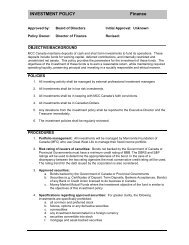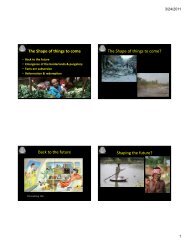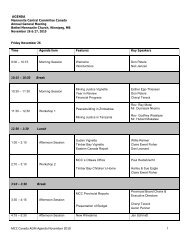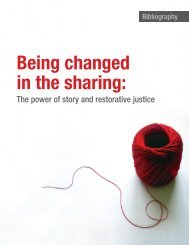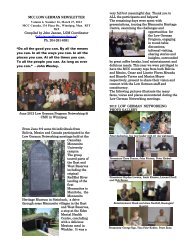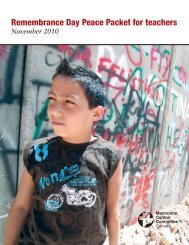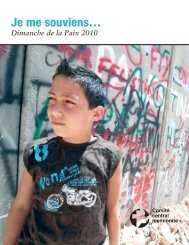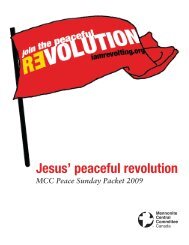Walking together: Healing and hope for Colombian refugees
Walking together: Healing and hope for Colombian refugees
Walking together: Healing and hope for Colombian refugees
Create successful ePaper yourself
Turn your PDF publications into a flip-book with our unique Google optimized e-Paper software.
w a l k i n g<br />
t o g e t h e r<br />
89<br />
FAMILY STRENGTHENING<br />
Underst<strong>and</strong>ing that the refugee family you sponsor has experienced <strong>and</strong> will continue to experience<br />
major stress as a family unit is an important starting place <strong>for</strong> planning how to support <strong>and</strong> strengthen<br />
them as a family once they arrive to your community. Family struggles within the refugee family is<br />
an area where the church has the opportunity to play a critical role, offering counsel, guidance <strong>and</strong><br />
encouragement to the family.<br />
As you think about this topic, it may be helpful to refer to the section Effects of Refugee Trauma on the<br />
Family.<br />
Some questions to guide you as you think about how you can support<br />
the family to stay strong.<br />
Some ideas:<br />
1. Is there anyone in your church or community that specializes in family counselling? What<br />
about a counsellor that speaks their language <strong>and</strong> is culturally sensitive? Could you go to<br />
them if the family needed specialized guidance? Ask your local MCC Refugee Coordinator<br />
about possibilities <strong>for</strong> provincial funding <strong>for</strong> this kind of counselling in your area.<br />
2. Who will take responsibility <strong>for</strong> talking openly to the family about their needs, challenges<br />
<strong>and</strong> struggles as a family <strong>and</strong> <strong>for</strong> connecting them to appropriate resources in the church<br />
<strong>and</strong> community?<br />
3. What are some laws related to the family that the <strong>Colombian</strong> family might not know?<br />
How can you organize a time to talk to them about family-related laws in Canada?<br />
4. What activities are there in your church <strong>for</strong> each of the refugee family’s members? Kid’s<br />
clubs or DVBS? Youth group? College <strong>and</strong> Careers group? Men’s groups? Women’s<br />
groups? How will you ensure that the members of the family are not only invited, but<br />
intentionally <strong>and</strong> genuinely included in these spaces?<br />
5. What will you do to ensure that the family does not feel “all alone,” especially at first.<br />
How will you coordinate responsibilities <strong>for</strong> organizing social events or leisure outings<br />
with the family?<br />
6. If there is evidence of domestic violence, how will you prepare to h<strong>and</strong>le it while causing<br />
the least damage to the family at the same time?<br />
1. Remember to check in with the family regularly during the year - not just at the<br />
beginning - regarding family struggles. Different issues will come up over the course of<br />
the year as the family adapts <strong>and</strong> as members take on new roles, meet new friends,<br />
<strong>and</strong> as children mature.<br />
2. Talking about family issues doesn’t need to be awkward of difficult. Just as all the<br />
families in your church <strong>and</strong> community face challenges, so does the refugee family.<br />
When you talk to the refugee family about their challenges, remind them that they are



